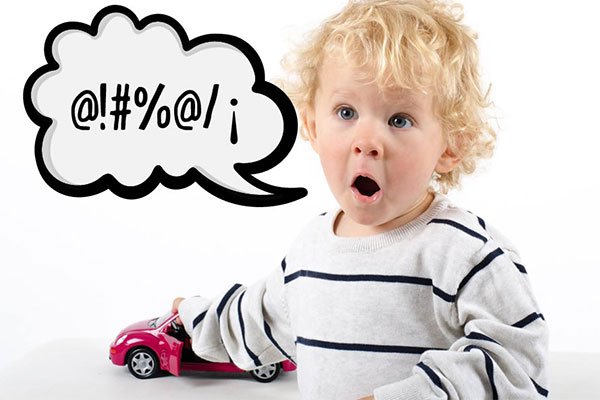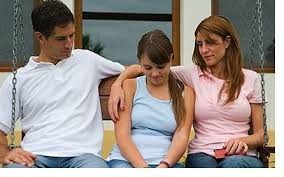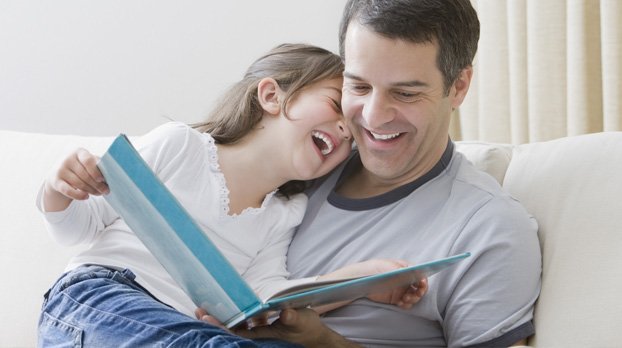Publication of the day: How to act when children say bad words. / Cómo actuar cuando los niños dicen malas palabras. (By @gmaktub)

As children grow they become more independent and able to do things that they could not do before. At this point is very important the example transmitted by parents, since a fundamental characteristic in children is that they are like sponge everything they want to imitate or do, sometimes without knowing the seriousness of their actions, just for the simple fact that Dad or mom did it. This often happens with the bad words, which say parents or adults and end up repeating children without knowing their meaning.
A medida que los niños van creciendo se hacen más independientes y con la capacidad de hacer cosas que antes no podían. En este punto es muy importante el ejemplo que trasmiten los padres, ya que una característica fundamental en los niños es que son como una esponja, todo lo quieren imitar o hacer, en ocasiones sin saber la gravedad de sus acciones, solo por el simple hecho de que papa o mama lo hizo. Esto pasa a menudo con las malas palabras, que dicen los padres o adultos y que terminan los niños repitiendo sin saber su significado.

What is a bad word?
It is a word that we consider that nobody should say, nor children, but sometimes the situations related to the emotions that adults live makes them say these bad words, without knowing the damage they are doing or if it affects others. Sometimes, a bad word has many meanings for different people and situations, that something is wrong for one person is not always for the other, or that sometimes ends up doing a lot of damage, so it is better to avoid it. This will depend on the ages of the people who say bad words, the environment in which the child is surrounded and the place where you live, since countries use words typical of their region that in another country do not have the same meaning.
¿Que es una mala palabra?
Es una palabra que consideramos que nadie debería decir, ni los niños, pero a veces las situaciones relacionadas con las emociones que viven los adultos les hace decir estas malas palabras, sin saber el daño que están haciendo o si afecta a los demás.
A veces, una mala palabra tiene muchos significados para diferentes personas y situaciones, que algo está mal para una persona no siempre es para la otra, o que a veces termina haciendo mucho daño, por lo que es mejor evitarlo. Esto dependerá de las edades de las personas que dicen malas palabras, el entorno en el que el niño está rodeado y el lugar donde usted vive, ya que los países usan palabras típicas de su región que en otro país no tienen el mismo significado.

How to avoid the use of bad words in children.
Cómo evitar el uso de malas palabras en los niños.
- It is important that adults give a good example to their children and avoid saying bad words in front of children, since they can believe it is a normal word and then repeat it in unexpected situations. In addition, the meaning of the word must be explained, why it should not be said, since it can harm other people and is not for daily use, children should understand that adults used it at a given time due to discomfort, sadness or any situation that puts you in an unpleasant position.
Es importante que los adultos den un buen ejemplo a sus hijos y eviten decir malas palabras delante de los niños, ya que pueden creer que es una palabra normal y luego repetirla en situaciones inesperadas. Además, el significado de la palabra debe ser explicado, por qué no se debe decir, ya que puede dañar a otras personas y no es para uso diario, los niños deben entender que los adultos lo usaron en un momento dado debido a la incomodidad, tristeza o cualquier situación que lo coloca en una posición desagradable.

- It must be explained that the bad words offend, annoy and are not respectful and that if someone else tells them to him, he would not like to be treated like that either. In the same way parents should avoid laughing or having fun when the child says his first bad word, since this attitude will be an error, it will only make the child confuse and tend to repeat it, it should show disinterest before this type of situations.
Debe explicarse que las malas palabras ofenden, molestan y no son respetuosas y que si alguien más se las cuenta, tampoco le gustaría que lo trataran así. De la misma manera, los padres deben evitar reír o divertirse cuando el niño diga su primera mala palabra, ya que esta actitud será un error, solo hará que el niño se confunda y tienda a repetirla, debería mostrar desinterés ante este tipo de situaciones.

- Alternatives of words should be offered to children, who can express their feelings or situations with new and funny words to replace those that are offensive and can cause greater problems or dislikes. You should also be aware of the occasions when the child wants to use bad words because it can be an act of disagreement and want to draw attention in that way, as an act of rebellion, as children tend to manifest themselves in different ways.
Se deben ofrecer alternativas de palabras a los niños, quienes pueden expresar sus sentimientos o situaciones con palabras nuevas y divertidas para reemplazar aquellas que son ofensivas y pueden causar mayores problemas o disgustos. También debe tener en cuenta las ocasiones en que el niño quiere usar malas palabras porque puede ser un acto de desacuerdo y desea llamar la atención de esa manera, como un acto de rebelión, ya que los niños tienden a manifestarse de diferentes maneras.

- If a child says a bad word, parents should look for the main cause instead of scolding immediately or laughing, since children repeat what they hear from other people. Knowing the origin will be fundamental to correct and prevent it from repeating itself, to talk with the child, to ask him where he heard that word, if he knows its meaning and why he repeats it. Communication is fundamental in any situation, to correct failures and improve.
Si un niño dice una mala palabra, los padres deben buscar la causa principal en lugar de regañar de inmediato o reír, ya que los niños repiten lo que escuchan de otras personas. Conocer el origen será fundamental para corregir e impedir que se repita, para hablar con el niño, para preguntarle dónde escuchó esa palabra, si conoce su significado y por qué lo repite. La comunicación es fundamental en cualquier situación, para corregir fallas y mejorar.

Nowadays.
Nowadays people use bad words not only when they are going through an uncomfortable situation, but also to make jokes, or nicknames, they practically see the use of bad words in a fun way and of everyday use, and should not be. We would be transforming the educated and cordial way of communicating. It is important to maintain and rescue good habits, values, and cordial treatment among all people.
The children must be in an agreeable and pleasant environment for their development. Also according to their age they are very intelligent and receptive able to understand any type of situation, as long as the adults explain and communicate in the best possible way. Bad words have a solution and an important point is communication.
En la actualidad.
Hoy en día las personas utilizan malas palabras no solo cuando están pasando por una situación incomoda, sino también para hacer bromas, chistes o poner apodos, prácticamente ven el decir malas palabras de una forma divertida y del uso cotidiano, y no debería ser, ya que estaríamos transformando la forma educada y cordial de comunicarnos. Es importante mantener y rescatar las buenas costumbres, los valores, y el trato cordial entre todas las personas.
Los niños deben estar en un ambiente acorde y agradable para su desarrollo. Además acorde a su edad son muy inteligentes y receptivo capaz de comprender cualquier tipo de situación, siempre y cuando los adultos expliquen y se comuniquen de la mejor manera posible. Las malas palabras tienen solución y un punto importante es la comunicación.


@Steemiteducation INVITE, cordially, the entire Venezuelan community, to participate actively in our educational community.
@Steemiteducation INVITA cordialmente a toda la comunidad Venezolana, a participar activamente en nuestra comunidad educativa.
Using the tags: #steemiteducation # edu-venezuela
Usando las etiquetas: #steemiteducation #edu-venezuela
Where you will find the guidelines to create a publication correctly.
It is important to follow the educational and motivating rules of education.
Donde encontraran las directrices para crear una publicación de manera correcta.
We thank the SteemitEducation community for the opportunity and confidence it gives all Venezuelans who belong to the platform to promote quality educational content.Es importante seguir las reglas educadores y motivadores de la educación.
Agradecemos a la comunidad SteemitEducation por la oportunidad y confianza que le brinda a todos los venezolanos que pertenecen a la plataforma, de promover contenido educativo de calidad.
Actualmente la comunidad necesita de nuestro apoyo para seguir creciendo, y así poder apoyar a más publicaciones de #steemiteducation #education-venezuela en el día.
In what way can you support?
¿De qué forma puedes apoyar?
- First step:
Primer paso:
Follow the Edu-venezuela Trail from [Steemauto.com] (https://steemauto.com/). It is very simple and easy.
- Start session and add SteemitEducation to your Curation Trail.
Sigue el Trail de edu-venezuela desde Steemauto.com. Es muy sencillo y fácil.
- Inicia sesión y agrega SteemitEducation a tu Curation Trail.
- Second step:
Segundo paso:
Delegate any amount of SteemPower to edu-venezuela.
Delega cualquier cantidad de SteemPower a edu-venezuela.
- Enter the great website created by @roelandp to delegate in a few simple steps.
Ingresa en el genial sitio web creado por @roelandp para delegar en unos sencillos pasos.
You can also delegate with just one click.
también puedes delegar con sólo un clic
10SP - 20SP - 50SP - 100SP - 200SP - 300SP - 400SP - 500SP
Any delegation will be accepted. In this 1st Stage we aim to raise 300SP help us to complete our goal.
Cualquier delegación será aceptada. En esta 1era Etapa tenemos como meta recaudar 300SP ayúdanos a completar nuestro objetivo.
Source
Please dear friend, if you wish to contribute voluntarily, leave in a comment of this publication the amount you will delegate !DO NOT FORGET!
Note: pay attention to our next publication with the list of all the contributors of edu-venezuela.
Por favor querido amigo,si deseas contribuir de manera voluntaria, deja en un comentario de esta publicación el monto que delegaras !NO LO OLVIDES!
Nota: esté atento a nuestra próxima publicación con la lista de todos los contribuyentes de edu-venezuela.
y Cuando sean pataletas, y no malas palabras?
En en caso de pataletas, esperar que se calmen, dependiendo de la edad del nino; explicarle serenamente lo incorrecto de hacer esos berriches.
Los ninos repiten esas malas palabras, generalmente siguiendo el ejemplo que dan en casa, sucede que cuando estan empezando a hablar dicen groserias y los adultos se rien , celebran y hasta le piden que las repitan, es entonces cuando los pequenos creen que es lo normal, sucede luego que ellos no entienden el motivo de la correccion.
Cuando lo escucharon en el colegio o en la calle, se les debe explicar con palabras sencillas el significado de ese termino y como pudiese ofender a otras personas.
Excelente publicación @edu-venezuela.
¡Realmente útil!
Mis felicitaciones para su autor @gmaktub.
Saludos.